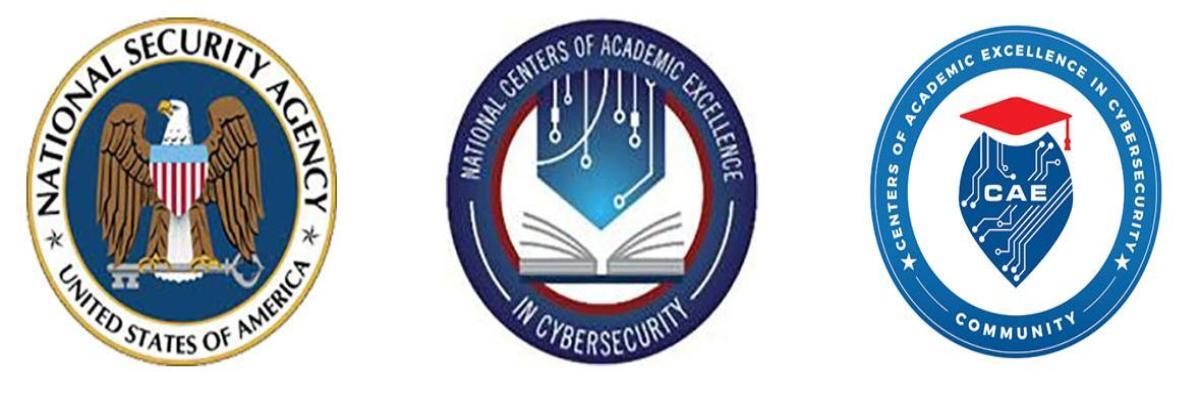
Both seasoned information technology students and newcomers to the field can get started through AACC’s Department of Cybersecurity, Networking and Digital Forensics. AACC is the first community college in the country to be certified by the National Security Agency.
AACC offers the following Associate of Applied Science (A.A.S.) degrees. The state of Maryland refers to the A.A.S. as a career degree, because it's intended to provide you with skills to enter the workforce. In some cases, AACC has entered into transfer agreements that allow these degrees to transfer to select colleges.
The digital forensics concentration prepares you with skills to enter the workforce by performing forensic investigations, incident handling and conducting incident investigations. You will gain the knowledge and skills necessary to execute forensic investigations of networks, hosts and mobile devices, including the use of standard computer forensics and evidence handling techniques to collect, process, review, analyze and produce electronic evidence. The program fully maps to the eight knowledge domains currently specified by the Department of Defense Cyber Crime Center (DC3) and fully prepares students for the Magnet Certified Forensic Examiner (MCFE) exam. Upon completion of the Advanced Digital Forensics certificate, students are eligible for DoD/DC3 National Centers of Digital Forensics Academic Excellence (CDFAE) program certificates. The program objectives also support the CompTIA Network+ and CompTIA Security+ certifications, but does not provide certification exam training or certification testing.
If you are interested in transferring to a four-year institution, AACC has the following agreements to ensure a direct transfer for this degree:
Note: Fast track option available for those already holding a college degree.
Loading... in the AACC College Catalog.
The networking concentration prepares you for careers installing, repairing and administering local and wide area networks. The program incorporates a study of data communication fundamentals together with an in-depth study of current networking architectures and protocols. Client/server and peer networks are studied together with hands-on laboratory time working with Microsoft, UNIX/LINUX and Cisco systems. The program objectives support the CCNA (Certified Cisco Network Administrator), CompTIA Network+ and CompTIA Security+ certifications, but does not provide certification exam training or certification testing.
If you are interested in transferring to a four-year institution, AACC has the following agreements to ensure a direct transfer for this degree:
Note: Fast track option available for those already holding a college degree.
Loading... in the AACC College Catalog.
The security concentration prepares you for entry-level careers in information assurance and cybersecurity. Computer security and information assurance concepts are augmented with current industry practices and tools. Topics cover threats and vulnerabilities, prevention at the technical (hardware and software) and human levels, detection, response and management aspects of security. The curriculum is a validated program of study by the National Security Agency as a National Center of Academic Excellence in Cyber Defense. The program objectives also support the CompTIA Network+ and CompTIA Security+ certifications, but does not provide certification exam training or certification testing.
If you are interested in transferring to a four-year institution, AACC has the following agreements to ensure a direct transfer for this degree:
Note: Fast track option available for those already holding a college degree.
Loading... in the AACC College Catalog.
This transfer program provides a solid information technology foundation for those students transferring to four-year colleges and universities to pursue a bachelor’s and/or master’s degree in cloud engineering. Students who have already selected a transfer college/university should consult with their department chair to plan their program and to keep abreast of program changes and updates to the articulation agreements between Anne Arundel Community College and the transfer institutions.
The department also offers the following certificates.
This certificate program provides you the knowledge and skills necessary to execute computer forensic investigations, including the use of standard computer forensics and evidence handling techniques to collect, process, review, analyze and produce electronic evidence. Upon completion of the Digital Forensics Advanced Certificate, students are awarded the Digital Media Collector and Digital Media Examiner certificates sponsored by the DC3 National Centers of Digital Forensics Academic Excellence program. Prior technical training or experience is recommended for this program.
You can earn this certificate for less than $4,500.
Loading... in the AACC College Catalog.
You will develop the hands-on skills and knowledge to protect computer networks including the design and implementation of firewalls, IDS, wireless security, cryptography, Linux security and Windows security. In addition to network security fundamentals, you will learn valuable defense and countermeasures.
You can earn this certificate for less than $3,000.
Loading... in the AACC College Catalog.
You will learn to install, configure, operate and troubleshoot medium-size router and switched networks. Principles include basic mitigation of security threats, introduction to wireless networking concepts and hands-on, performance-based skills. The certificate objectives support the Cisco Certified Network Associate (CCNA) certification but does not provide certification exam training or certification testing.
You can earn this certificate for less than $2,500.
Loading... in the AACC College Catalog.
Plan, implement, verify and troubleshoot local and wide-area enterprise networks. In this certificate program, you will learn advanced IP addressing and routing in implementing scalable and highly secure Cisco routers that are connected to LANs, WANs and IPv6. Plan, configure and verify the implementation of complex enterprise switching solutions that use the Cisco Enterprise Campus Architecture. Plan and perform regular maintenance on complex enterprise routed and switched networks. Use technology-based practices and a systematic ITIL-compliant approach to perform network troubleshooting.
You can earn this certificate for less than $2,500.
Loading... in the AACC College Catalog.
This certificate is designed for students who have previous IT experience either from job or prior learning. Students are expected to have a working knowledge of computer systems and networking including Windows Server, TCP/IP, Virtualization, etc. Students may be changing careers, transitioning back into the workforce and/or former military.
You can earn this certificate for less than $3,500.
Cloud Computing (certificate) in the AACC catalog.
This certificate prepares you to manage a typical UNIX/LINUX system installation, including managing networks, users, security and scripting.
You can earn this certificate for less than $3,000.
Loading... in the AACC College Catalog.
You will learn to perform basic troubleshooting of computer systems and networks, acquire in-depth knowledge of TCP/IP, Cisco ISO and experience configuring Cisco routers. The program objectives support the CompTIA Network+, CompTIA Security+, and CCENT (Cisco Certified Entry Network Technician) certifications, but does not provide certification exam training or certification testing. If you are interested, contact the certificate coordinator at 410-777-2442.
You can earn this certificate for less than $5,000.
Loading... in the AACC College Catalog.
This certificate program is intended for students with previous technical training or experience. You will learn the skills necessary to execute computer forensic investigations, including the use of standard computer forensics and evidence handling techniques to collect, process, review, analyze and produce electronic evidence.
You can earn this certificate for less than $3,500.
Loading... in the AACC College Catalog.
You will gain the skills and knowledge required to configure LAN and WAN networks and to understand the basics of network cybersecurity theory and operation.
You can earn this certificate for less than $3,000.
Loading... in the AACC College Catalog.
You will learn how to support and maintain the integrity of systems, software, network, storage devices and data directly related to Windows and Linux server operations. You will develop systems and network administration functions such as installing, integrating, documenting and maintaining software, firmware, computer, networks and storage systems, development and user environments, assisting system users and managing user accounts, and performing technical documentation and process engineering functions.
You can earn this certificate for less than $4,000.
Loading... in the AACC College Catalog.

AACC is a designated National Center of Academic Excellence in Cyber Defense (CAE-CD) by the NSA and is part of the Centers of Academic Excellence in the cybersecurity community. The purpose of CAE-CD is to encourage two-year colleges to grow and strengthen their cybersecurity programs.

AACC was the first institution in the nation to be designated a National Center of Digital Forensics Academic Excellence (CDFAE) by the Defense Cyber Crime Center (DC3). CDFAE is the academic component of a partnership with government to create standards and best practices for digital forensics practitioners, educators and researchers. The goal of the program is to increase the number of qualified digital forensics professionals.

The Information Assurance and Cybersecurity (Associate of Applied Science) program is accredited by the Computing Accreditation Commission (CAC) of ABET. ABET accreditation provides assurance that our degree program meets the quality standards for preparing graduates in the cybersecurity profession.
Graduates in the Information Assurance and Cybersecurity Associate of Applied Science (A.A.S.) degree program are expected to achieve the following shortly after graduation:
Enrollment
| Information Assurance and Cybersecurity, Associate Degrees: | July 1, 2020-June 30, 2021 | July 1, 2021-June 30, 2022 | July 1, 2022-June 30, 2023 | July 1, 2023-June 30, 2024 | July 1, 2024-June 30, 2025 |
|---|---|---|---|---|---|
| Digital Forensics | 151 | 119 | 88 | 102 | 130 |
| Networking | 125 | 133 | 131 | 131 | 145 |
| Security | 327 | 290 | 295 | 321 | 320 |
Graduates
| Information Assurance and Cybersecurity, Associate Degrees: | July 1, 2020-June 30, 2021 | July 1, 2021-June 30, 2022 | July 1, 2022-June 30, 2023 | July 1, 2023-June 30, 2024 | July 1, 2024-June 30, 2025 |
|---|---|---|---|---|---|
| Digital Forensics | 38 | 26 | 11 | 6 | 16 |
| Networking | 20 | 17 | 21 | 17 | 25 |
| Security | 56 | 52 | 48 | 49 | 40 |
Cybersecurity, Networking and Digital Forensics department representatives meet biannually with industry partners and agencies, such as DC3, Collins Aerospace (ARINC), Broadcom and PowerTrain Inc., as well as AACC’s director of Information Security. The advisory board examines and improves degree and certificate programs to ensure they are current and relevant to fulfill the growing demands of the cybersecurity and IT related industry sectors. The board members bring an array of technical and management skills and backgrounds that contribute to the development of programs, courses and competencies that lead students into successful careers upon graduation.
If Cybersecurity, Networking and Digital Forensics sounds appealing, but you'd like to compare it to other AACC offerings, check out one of these related studies!